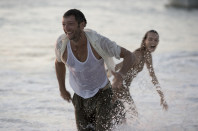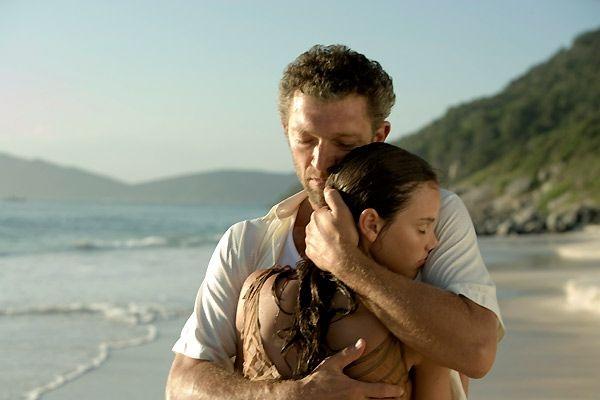Adrift (A Deriva), Brazilian director Heitor Dhalia’s third feature film, is a sensuous coming-of-age story as well as an ode to the Brazilian beach landscape of Buzios and the band of gorgeous bikini-clad teenagers who run wild in it. Although Dhalia says the film is not strictly autobiographical, he concedes that it partly mirrors his own childhood beach holidays near Recife and his parents’ divorce when he was 10.
The family in Adrift - which is set in the 1980s (you can tell because a typewriter features heavily and there are no iPods or mobiles) - seems idyllically happy at first glance. The first scene shows the dad and his teenage daughter drifting blissfully together on the waves but, of course, there’s no smooth sailing ahead.
Filipa, the central character, 14 years old and the eldest, watches her parents’ marriage crumble and jumps to naive, though understandable, conclusions as to why. We see this privileged, laissez-faire world of bohemian middle classes and their beach houses - all beautiful shadowy interiors and Georges de La Tour-style lighting - and endless summer days and nights through the direct gaze of the impressive Laura Neiva in her first role. Neiva was discovered by Dhalia through the social networking site Orkut and thought his offer of a screen test was a joke. She, like the other children in the film, was given no screenplay but worked, says Dhalia, through improvisation and workshops centered round dramatic scenes. Only charismatic French star Vincent Cassel (Mesrine and Eastern Promises), here playing a family man for once (he already spoke some Portuguese but had to step it up for the role of Mathias, the father), and Debora Bloch, a well-known Brazilian actress who gives a subtle performance as Clarice, the mother, were given scripts
Mathias and Clarice are selfish, immature and caught up in their affairs and resentments, though their intense love for their children is never in question. But as the parents dance to The Ronettes’ "Be My Baby" and Filipa disapprovingly gets her mother a whisky refill, you wonder who exactly the children are here. "Why do you never wash up your plate?" asks Clarice. "I never have," replies Mathias, and bribes the kids with ice cream to do the washing-up for him. Clarice is drifting into alcoholism and passes out on the bathroom floor; Filipa has to shower her down and get her into bed while her curly-haired little brother cries silently.
Mathias, a successful author, is having an affair with an American woman (the stunning Camilla Belle, whose fabulous style makes her a focal point of the film) who lives in a dramatic hill-top house nearby. Filipa discovers her photo in her father’s desk drawer and becomes obsessed with tailing him. She takes off on her scooter with her semi-boyfriend - in a game of truth or dare he says she’s the prettiest in the group - and together, in an erotic blurring of who’s caressing who, they hide in the shadows outside a window and watch, transfixed. Afterwards, Filipa rejects her boyfriend and, of course, her father.
 Unsettling questions emerge slowly. Why is Clarice so dismissive of the characters in Mathias’s novels and why does she look so stunned when he describes the plot of his latest one to their friends? The parents tell the children nothing, wanting to protect them, but when finally, in a touchingly convincing scene, they let the kids know that they’re going to separate, Filipa refuses to let herself be comforted like her tearful younger siblings and flounces out, sure that her father is leaving because of his affair. He attempts to discipline her when she won’t co-operate in helping her brother and sister. "I’m not a child and I’ll never understand," she says. "All you do is lie. You’re grounded," he retaliates feebly. Well, that’s never going to work, and sure enough, Filipa’s soon downing some whiskies herself and losing her virginity on someone’s boat, just after Clarice’s secret and its chilling outcome are revealed.
Unsettling questions emerge slowly. Why is Clarice so dismissive of the characters in Mathias’s novels and why does she look so stunned when he describes the plot of his latest one to their friends? The parents tell the children nothing, wanting to protect them, but when finally, in a touchingly convincing scene, they let the kids know that they’re going to separate, Filipa refuses to let herself be comforted like her tearful younger siblings and flounces out, sure that her father is leaving because of his affair. He attempts to discipline her when she won’t co-operate in helping her brother and sister. "I’m not a child and I’ll never understand," she says. "All you do is lie. You’re grounded," he retaliates feebly. Well, that’s never going to work, and sure enough, Filipa’s soon downing some whiskies herself and losing her virginity on someone’s boat, just after Clarice’s secret and its chilling outcome are revealed.
The rocks and the endless ocean dominate Adrift, with Filipa and Mathias reconciled at the end as they float peacefully on the waves, eyes closed, just as they did in the first scene but changed now, not just by dramatic events but by the process of growing up.















Add comment